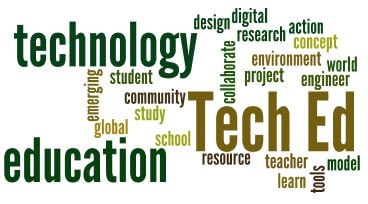Important Resources for Establishments to Improve Their Approach to Technology Education And Learning
As organizations aim to improve their technology education structures, the identification and implementation of crucial resources come to be extremely important. Cutting-edge curriculum designs that incorporate modern technology, together with reliable on-line understanding systems, can considerably broaden academic ease of access and involvement.
Innovative Curriculum Styles
In today's rapidly evolving technological landscape, instructors are increasingly identifying the demand for cutting-edge educational program styles that effectively integrate innovation right into learning experiences. This combination is vital for preparing students for a future where electronic literacy is vital. Cutting-edge curriculum layouts include different pedagogical approaches, guaranteeing that innovation serves as a device for boosting engagement and facilitating deeper learning.
One reliable strategy is project-based learning (PBL), where pupils involve in real-world troubles, using technology to study, team up, and offer their findings. This method not only cultivates vital thinking yet likewise encourages the growth of soft abilities such as team effort and communication. In addition, flexible knowing innovations can customize the academic experience, providing to specific learning designs and paces.
Additionally, interdisciplinary techniques that blend subjects, such as combining scientific research and modern technology with the arts, help develop a much more all natural knowing atmosphere. This fosters creative thinking and advancement, gearing up students with the skills necessary to flourish in a facility, interconnected world. Inevitably, ingenious curriculum layouts are important for cultivating a generation of students who are not just competent in modern technology however are likewise adept trouble solvers and vital thinkers.
Online Knowing Platforms
Several instructors are turning to on-line learning systems as vital tools for boosting educational accessibility and involvement. These systems assist in a crossbreed discovering atmosphere that accommodates diverse understanding designs and speeds, making education much more comprehensive. They provide a range of sources, including video clip talks, interactive simulations, and conversation online forums, enabling trainees to access content from anywhere any time.
Prominent online learning systems, such as Coursera, edX, and Moodle, offer establishments with the infrastructure needed to supply top notch modern technology education and learning. These platforms can be tailored to straighten with certain educational program goals and pedagogical techniques, guaranteeing that establishments can keep their academic requirements while leveraging digital resources.
In addition, on the internet discovering systems sustain partnership amongst teachers and pupils, promoting a feeling of area and shared learning experiences. Advanced analytics devices available on these platforms allow educators to track pupil progress and interaction, helping with prompt treatments when needed.
Professional Growth Opportunities
Continuous specialist growth is important for teachers looking for to stay abreast of emerging modern technologies and instructional approaches in a rapidly advancing academic landscape (Make Money). To properly integrate technology right into the classroom, teachers must proactively go after chances that enhance their skills and expertise
Organizations should focus on offering courses, workshops, and workshops focused on the most current technological developments and mentor approaches. These programs can attend to different facets of technology education and learning, including coding, electronic literacy, and making use of instructional software application. Additionally, partnering with regional colleges and tech organizations can offer instructors accessibility to specialized training and sources.
Online expert development platforms likewise supply adaptability, enabling instructors to participate in self-paced knowing. Webinars and digital conferences can help with knowledge sharing among teachers worldwide, cultivating an international point of view on innovation combination.
Moreover, mentorship programs can attach seasoned teachers with those new to technology, advertising joint discovering and assistance. By creating a society of continual knowing, establishments can encourage teachers to accept innovative training strategies, ultimately enhancing pupil interaction and success in innovation education. Spending in specialist development not only advantages teachers but also considerably enriches the discovering experience for trainees.
Joint Tools and Resources
Reliable integration of innovation in education likewise counts on the usage of collective tools and resources that facilitate interaction and teamwork among instructors and pupils. Such tools improve involvement and promote a culture of collaboration, critical for contemporary knowing environments. Systems like Google Work Area and Microsoft Teams allow real-time paper sharing, task monitoring, and seamless interaction, permitting teams to collaborate efficiently regardless of geographical obstacles.
Additionally, discovering monitoring systems (LMS) such as Canvas and Moodle give organized environments for partnership, where teachers can produce forums, assign group tasks, and facilitate conversations. These platforms not just improve training distribution but additionally urge peer-to-peer interaction, necessary for constructing crucial reasoning and analytic abilities.
In addition, devices like Padlet and Trello can be used to envision concepts and manage jobs collaboratively, boosting project-based discovering experiences. By incorporating these collective sources, institutions empower both students and instructors to contribute actively to their finding out journeys. Inevitably, the effective use of joint tools not just enriches the academic experience however likewise prepares pupils to prosper in an increasingly interconnected globe.
Neighborhood and Market Collaborations
Area and industry collaborations play an important duty in boosting modern technology education by connecting the space in between academic expertise and practical application. These cooperations provide trainees with real-world experiences, allowing them to use class concepts to real obstacles encountered by organizations. By involving with regional companies and area companies, schools can develop vibrant discovering settings that foster innovation and skill development.

Furthermore, these alliances can lead to resource sharing, where organizations benefit from sector innovation, funding, and competence. Such support not only improves educational offerings but additionally aids to grow a labor force that is well-prepared for the obstacles of the contemporary economic situation. Ultimately, the synergy created through community and sector partnerships is vital for promoting a society of constant knowing and adjustment in technology education and learning, making certain that organizations continue to be receptive to advancing technical landscapes.
Conclusion

One effective strategy is project-based understanding (PBL), where trainees involve in real-world problems, utilizing technology to Make Money research, work together, and offer their findings. Furthermore, flexible knowing modern technologies can customize the instructional experience, providing to specific understanding styles and paces.
Moreover, mentorship programs can connect seasoned instructors with those new to technology, promoting joint discovering and assistance. By creating a culture of continual knowing, institutions can encourage educators to welcome ingenious mentor strategies, ultimately improving student interaction and success in innovation education. Inevitably, the harmony developed via area and industry partnerships is essential for fostering a culture of continual understanding and adjustment in technology education, ensuring that establishments continue to be receptive to developing technological landscapes.